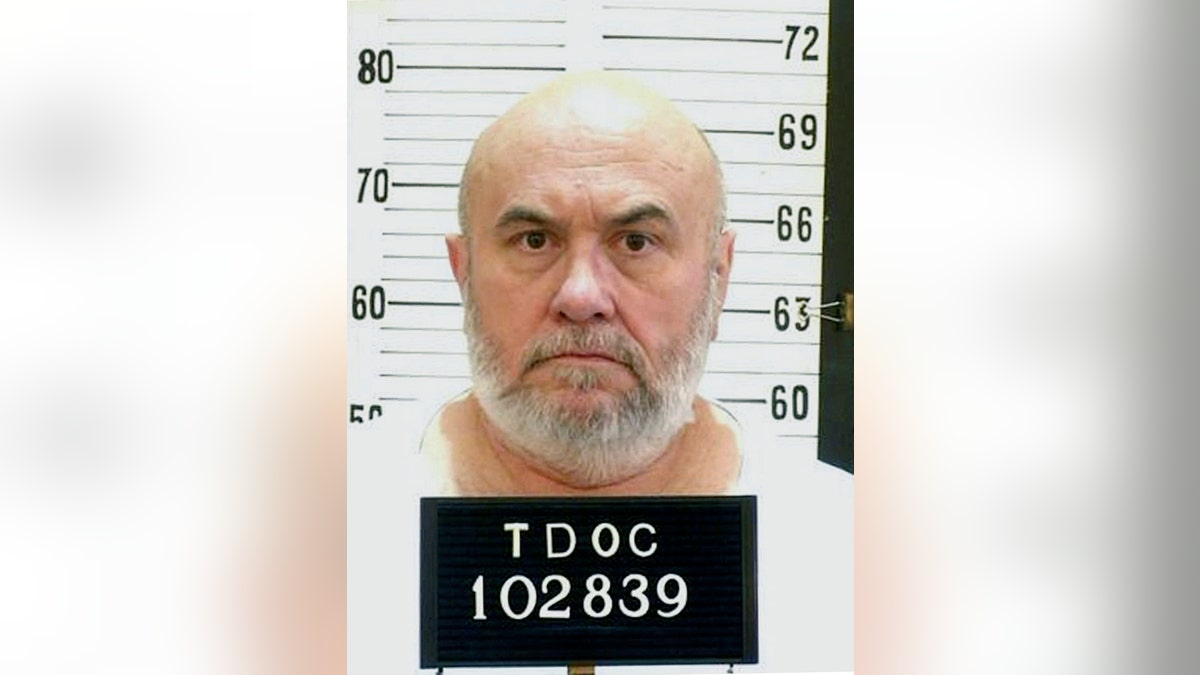
FILE - This undated file photo released by the Tennessee Department of Corrections shows death row inmate Edmund Zagorski in Tennessee. If Tennessee electrocutes Zagorski, it will be in an electric chair built by a self-taught execution expert who is no longer welcome in the prison system. (Tennessee Department of Corrections via AP, File)
NASHVILLE, Tenn. – The Latest on planned execution of Tennessee death row inmate Edmund Zagorski (all times local):
7:50 p.m.
A Tennessee inmate's final words were "Let's rock" before he became the first man executed in the electric chair since 2007 in Tennessee.
A reporter who witnessed the execution says 63-year-old iunmate Edmund Zagorski mostly looked ahead but did look around the death chamber at a Nashville prison in the minutes before his death. When asked if he had any last words, he said, "Let's rock."
The eyewitness says he grimaced as a sponge was put over his head. The witnesss says the inmate raised up in his chair when each jolt of electricity went through him.
In opting for the electric chair over a lethal injection as Tennessee allowed him, Zagorski had argued it would be a quicker and less painful way to die. He became only the second person to die in the electric chair in Tennessee since 1960.
Nationwide, only 14 other people have been put to death in the electric chair since 2000, including a Virginia inmate in 2013.
Prosecutors say Zagorski shot John Dotson and Jimmy Porter and slit their throats in April 1983 after robbing them during a drug deal.
___
7:30 p.m.
Tennessee has used its electric chair for the first time since 2007, executing an inmate for the killings of two other men during a 1980s drug deal.
Authorities say 63-year-old Edmund Zagorski was pronounced dead at 7:26 p.m. Thursday at a Nashville maximum-security prison.
In opting for the electric chair over a lethal injection as Tennessee allowed him, Zagorski had argued it would be a quicker and less painful way to die. He became only the second person to die in the electric chair in Tennessee since 1960.
Nationwide, only 14 other people have been put to death in the electric chair since 2000, including a Virginia inmate in 2013.
Prosecutors say Zagorski shot John Dotson and Jimmy Porter and slit their throats in April 1983 after robbing them when they sought to buy marijuana from him.
___
7:10 p.m.
The U.S. Supreme Court has denied a request to halt the scheduled execution of a Tennessee inmate in the electric chair.
The court said in a statement Thursday evening that it would not block the state's plans to put to death 63-year-old inmate Edmund Zagorski at a Nashville prison.
Zagorski had asked the court take up his claim that it's unconstitutional to force him to choose between the electric chair and lethal injection. His attorney said Zagorski chose the chair thinking it would be quicker and less painful, but he maintains both methods are unconstitutional
The court statement says Justice Sonia Sotomayor was the dissenting voice, noting Zagorski's decision to opt for the electric chair.
Says Sotomayor: "He did so not because he thought that it was a humane way to die, but because he thought that the three-drug cocktail that Tennessee had planned to use was even worse. Given what most people think of the electric chair, it's hard to imagine a more striking testament — from a person with more at stake — to the legitimate fears raised by the lethal-injection drugs that Tennessee uses."
___
4 p.m.
Vigils have been organized across Tennessee to oppose the state's plans to put an inmate to death in the electric chair.
Edmund Zagorski is scheduled to be executed at chair 7 p.m. CDT Thursday at a maximum-security prison in Nashville.
Tennesseans for Alternatives to the Death Penalty have planned vigils at the West End United Methodist Church in Nashville, the Market Square stage in Knoxville, and the Memphis Theological Seminary. All the vigils were set to begin at 6:30 p.m. local time.
Zagorski was sentenced to death in 1984 for killing two men during a drug deal. He requested the electric chair over lethal injection just days before he was to be executed three weeks ago, prompting the governor to step in to allow the state time to prepare for a change of execution method.
___
11:20 a.m.
With just hours left before his scheduled execution, condemned Tennessee inmate Edmund Zagorski is asking the U.S. Supreme Court to put a stop to the plan.
On Thursday, Zagorski asked the court take up his claim that it's unconstitutional to force him to choose between the electric chair and lethal injection. Zagorski chose the chair because he thinks it will be quicker, but he maintains that both methods are unconstitutional.
Zagorski already had a petition pending in a different case. That one claims Zagorski had bad lawyers at trial, resulting in an unfair verdict.
Zagorski is scheduled to be executed at 7 p.m. in Nashville's Riverbend Maximum Security Institution. He was sentenced in 1984 for his convictions in the slayings of two men during a drug deal.
___
5 a.m.
Tennessee is scheduled to execute a double-murderer in the electric chair Thursday evening.
If it goes ahead as scheduled, Edmund Zagorski would be only the second person put to death by electrocution in Tennessee since 1960. Daryl Holton chose to die in the electric chair in 2007.
The last person to be executed by electrocution in the U.S. was Robert Gleason, who was put to death in Virginia in 2013.
Zagorski chose the chair after his legal challenge to Tennessee's midazolam-based lethal injection protocol failed. His attorneys say he believes death by electrocution would be quicker and less painful, but he maintains that both methods are unconstitutional.
Zagorski was sentenced to die in 1984 for the slayings of two men during a drug deal.

